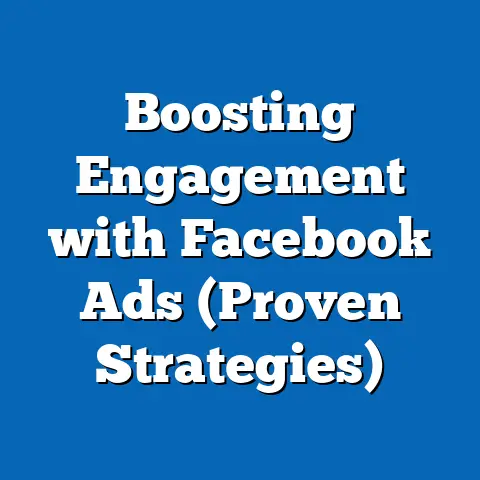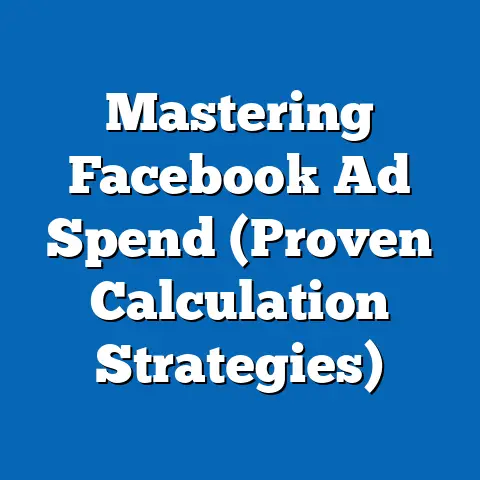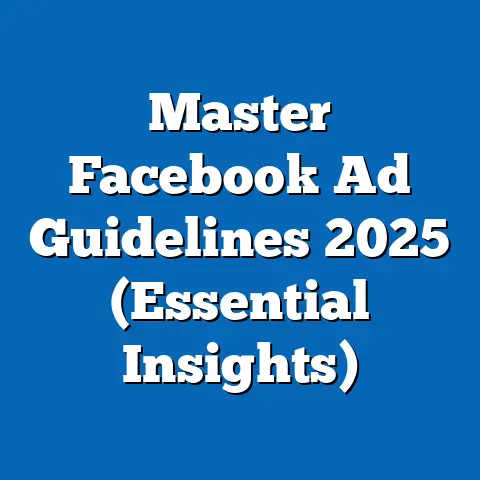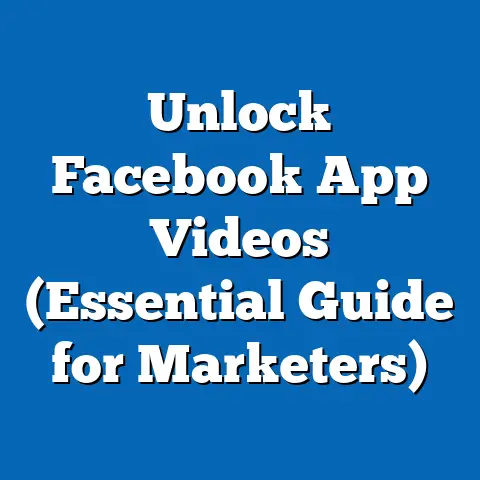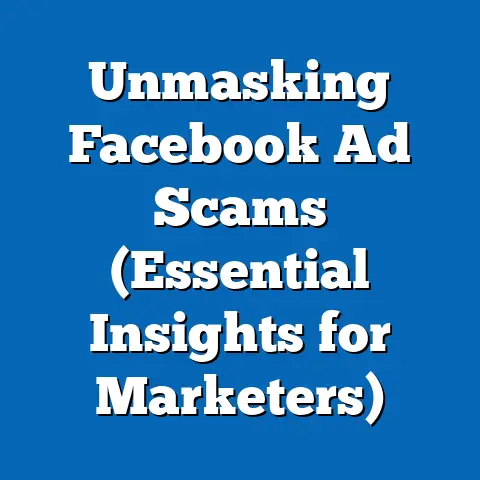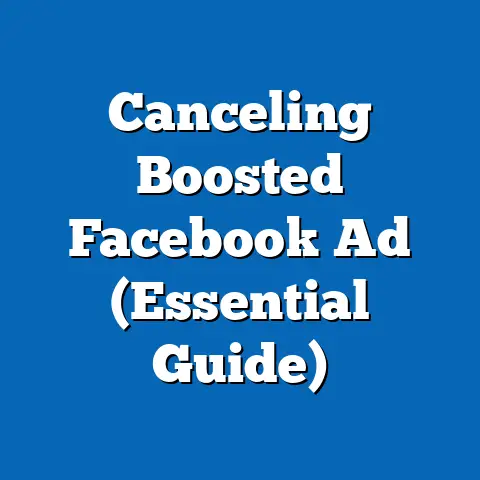Do I Need a Website for Facebook Video Ads? (Essential Insight)
Unveiling the Truth About Facebook Video Ads and Websites
According to a recent HubSpot report, video content is a whopping 1200% more likely to be shared than text and image content combined!
That’s a statistic that should make any marketer sit up and take notice.
Facebook video ads are a powerful tool.
But is a website an absolute necessity to harness their full potential?
That’s what I’m here to break down for you.
We’ll explore the benefits, the exceptions, and everything in between, backed by my own experiences and industry insights.
Understanding Facebook Video Ads: A Powerful Marketing Tool
First, let’s make sure we’re all on the same page.
What are Facebook video ads?
Simply put, they’re video content that you pay to promote on Facebook (and Instagram, since they’re under the Meta umbrella).
These ads can appear in various places:
- In-Feed: These are the videos that pop up as users scroll through their newsfeeds.
They blend seamlessly with organic content. - Stories: Short, engaging videos that disappear after 24 hours.
Perfect for quick updates, behind-the-scenes glimpses, or limited-time offers. - Reels: Similar to TikTok, these are short, entertaining videos designed to capture attention and go viral.
- In-Stream: These are the ads that play before, during, or after other videos on Facebook Watch.
The beauty of video ads is their ability to grab attention in a crowded digital space.
People are visual creatures, and video is inherently more engaging than static images or text.
This is why video consumption on social media platforms is constantly on the rise.
I remember back in 2015 when I first started experimenting with video ads, the results were immediately noticeable – a significant jump in engagement compared to my image-based ads.
The Foundation: The Role of a Website in Digital Marketing
Now, let’s talk about websites.
In today’s digital world, a website is more than just an online brochure.
It’s the digital storefront, the 24/7 customer service rep, and the central hub for your brand.
It’s where potential customers go to learn more about you, your products, and your values.
Think of your website as your home base.
Your social media profiles, email campaigns, and even your Facebook video ads are like outposts – they attract visitors, but ultimately, you want to guide them back to your home base where you have complete control over the experience.
I’ve seen firsthand how a well-designed website can transform a business.
It’s not just about looking pretty; it’s about providing value, building trust, and guiding visitors toward a desired action, whether it’s making a purchase, filling out a form, or simply learning more.
The Power Couple: Benefits of a Website with Facebook Video Ads
So, what happens when you combine the power of Facebook video ads with the foundation of a solid website?
Here are some key benefits:
Brand Credibility and Trust
Imagine seeing a compelling video ad on Facebook for a new product.
You’re intrigued, so you click on the ad.
Where do you expect to go?
If the ad leads to a professional, well-designed website, you’re much more likely to trust the brand and consider making a purchase.
On the other hand, if the ad leads to a generic landing page or, worse, directly to a checkout page with no supporting information, you might feel a bit skeptical.
A website provides the opportunity to showcase your brand story, highlight customer testimonials, and offer detailed product information, all of which build trust and credibility.
I had a client who was initially hesitant to invest in a website, thinking that social media was enough.
But after launching a professional website and linking it to their Facebook ads, they saw a significant increase in conversion rates.
The website provided the social proof and detailed information that customers needed to feel confident in their purchase.
Lead Generation and Conversion
A website is a lead generation machine.
You can use forms, landing pages, and other tools to capture valuable information from potential customers.
When you run Facebook video ads that drive traffic to your website, you’re essentially funneling qualified leads into your system.
For example, you could create a video ad that promotes a free e-book or a webinar.
When users click on the ad, they’re taken to a landing page on your website where they can sign up in exchange for their email address.
This allows you to build your email list and nurture leads over time.
I once ran a campaign for a software company that generated over 500 leads in a single month using this strategy.
The video ad highlighted the key benefits of the software, and the landing page provided a clear call to action.
The result was a steady stream of qualified leads that ultimately converted into paying customers.
Enhanced Analytics and Tracking
One of the biggest advantages of having a website is the ability to track user behavior and ad performance using tools like Google Analytics.
You can see where your traffic is coming from, what pages people are visiting, how long they’re staying on your site, and what actions they’re taking.
This data is invaluable for optimizing your Facebook video ads.
You can see which ads are driving the most traffic, which landing pages are converting the best, and which user segments are most engaged.
With this information, you can refine your targeting, messaging, and creative to improve your ROI.
Without a website, you’re essentially flying blind.
You can see how many people clicked on your ad, but you have no idea what they did afterward.
Did they bounce immediately?
Did they explore your product pages?
Did they make a purchase?
A website provides the insights you need to make informed decisions.
Content Control and Flexibility
Social media platforms are great for reaching a wide audience, but you’re ultimately at the mercy of their algorithms and policies.
With a website, you have complete control over your content and marketing messages.
You can create long-form blog posts, detailed product descriptions, and engaging video content that tells your brand story in your own words.
You’re not limited by character counts or platform restrictions.
This allows you to create a more comprehensive and compelling experience for your visitors.
I’ve found that using a website to host long-form content and then promoting it through Facebook video ads is a highly effective strategy.
It allows you to provide valuable information to your audience while driving traffic to your website, where you can further engage and convert them.
The Exceptions: When a Website Isn’t Essential
Okay, I’ve made a pretty strong case for having a website when running Facebook video ads.
But are there situations where it’s not absolutely necessary?
Absolutely.
Here are a few scenarios:
- Local Service Businesses: If you’re a local plumber, electrician, or landscaper, you might be able to get away with running Facebook video ads that drive traffic directly to your Facebook page or encourage users to call you directly.
The focus is on immediate action and local awareness. - Direct-to-Consumer Brands Using Social Media for Sales: Some brands have built their entire business on social media platforms like Instagram and Facebook.
They use features like Facebook Shops and Instagram Shopping to sell directly to their followers without ever needing a website. - App Installs: If your goal is simply to get people to download your app, you can run Facebook video ads that link directly to the app store.
No website required. - Lead Generation Forms on Facebook: Facebook offers lead generation ads that allow you to collect leads directly within the platform.
This can be a great option if you don’t have a website or landing page.
However, even in these situations, I would still argue that a website can add value.
It provides a place to showcase your expertise, build trust, and offer a more comprehensive brand experience.
Real-World Examples: Success Stories
Let’s look at some real-world examples to illustrate the point.
- Company A (With a Website): A software company runs Facebook video ads promoting a free trial of their product.
The ads link to a landing page on their website where users can sign up.
They track user behavior using Google Analytics and optimize their ads based on the data.
Result: High conversion rates and a steady stream of new customers. - Company B (Without a Website): A local restaurant runs Facebook video ads showcasing their menu items.
The ads encourage users to call them directly to place an order.
While they get some immediate sales, they struggle to build a loyal customer base and have limited data on ad performance. - Company C (Direct-to-Consumer): A clothing brand uses Instagram Shopping to sell their products directly to their followers.
They run engaging video ads showcasing their latest collections.
They see strong sales, but they rely entirely on Instagram’s platform and have limited control over their brand experience.
These examples highlight the different outcomes that can result from using Facebook video ads with and without a website.
While success is possible without a website, it’s often more sustainable and scalable with one.
The Future of Facebook Video Ads and Websites: Integration is Key
Looking ahead, I believe the integration of social media and e-commerce will continue to grow.
Facebook and Instagram are constantly adding new features that make it easier for businesses to sell directly to their followers.
However, I don’t think websites will become obsolete anytime soon.
They will continue to serve as the central hub for brands, providing a place to build trust, generate leads, and control the customer experience.
The key will be to seamlessly integrate your Facebook video ads with your website.
Use your ads to drive traffic to your website, and then use your website to engage and convert your visitors.
Conclusion: The Verdict
So, do you need a website to run effective Facebook video ads?
The answer is: it depends.
If you’re a local service business looking for immediate sales, you might be able to get away with running ads that drive traffic directly to your Facebook page or encourage users to call you.
If you’re a direct-to-consumer brand selling on social media, you might be able to rely on features like Facebook Shops and Instagram Shopping.
However, if you’re serious about building a brand, generating leads, and tracking your ad performance, a website is essential.
It provides the foundation you need to build trust, engage your audience, and drive conversions.
In my experience, the most successful Facebook video ad campaigns are those that are integrated with a well-designed website.
It’s a powerful combination that can help you achieve your marketing goals and grow your business.
Key Takeaways:
- Video content is highly engaging and shareable.
- A website builds brand credibility and trust.
- Websites facilitate lead generation and conversion.
- Websites offer enhanced analytics and tracking.
- Websites provide content control and flexibility.
- Success is possible without a website, but it’s often more sustainable with one.
- The future is in the integration of social media and e-commerce.
So, before you launch your next Facebook video ad campaign, take a moment to consider whether you have a solid website in place.
It could be the missing piece that takes your ads from good to great.

